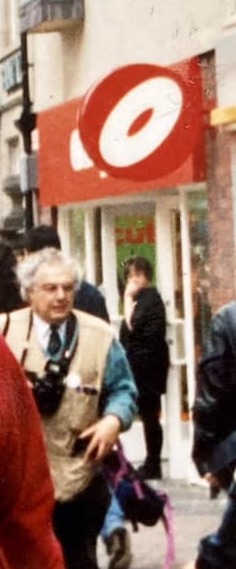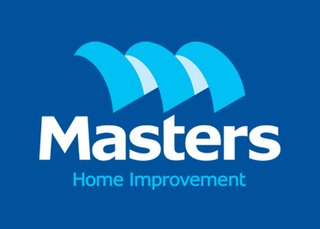
Blockbuster is an American multimedia brand and former rental store chain. The business was founded by David Cook in 1985 as a single home video rental shop, but later became a public store chain featuring video game rentals, DVD-by-mail, streaming, video on demand, and cinema theater. The logo was designed by Lee Dean at the Rominger Agency. The company expanded internationally throughout the 1990s. At its peak in 2004, Blockbuster employed 84,300 people worldwide and operated 9,094 stores.

HMV is a music and entertainment retailer, founded in the United Kingdom in 1921. In most of the world, the brand is owned by JD Sports and operated by Sunrise Records, except in Japan, where it is owned and operated by Lawson.
Dick Smith Electronics Holdings Limited was an Australian chain of retail stores that sold consumer electronics goods, hobbyist electronic components, and electronic project kits. The chain expanded successfully into New Zealand and unsuccessfully into several other countries. The company was founded in Sydney in 1968 by Dick Smith and owned by him and his wife until they sold 60% to Woolworths in 1980, and the remaining 40% two years later.
Bunnings Group Limited, trading as Bunnings Warehouse or Bunnings, is an Australian household hardware and garden centre chain. The chain has been owned by Wesfarmers since 1994, and has stores in Australia and New Zealand.

Our Price was a British high Street chain of record stores in the United Kingdom and Ireland from 1971 until 2004. Ourprice.com reopened online on 30 April 2024 with new owners.
Harvey Norman is an Australian multinational retailer of furniture, bedding, computers, communications and consumer electrical products. It mainly operates as a franchise, with the main brand and all company-operated stores owned by ASX-listed Harvey Norman Holdings Limited. As of 2022, there are 304 company-owned and franchised stores in Australia, New Zealand, Europe and South-East Asia operating under the Harvey Norman, Domayne and Joyce Mayne brands in Australia, and under the Harvey Norman brand overseas.

JB Hi-Fi Limited is an Australian consumer electronics retail company. It is publicly listed on the Australian Securities Exchange. Its headquarters are located in Southbank, Melbourne, Victoria.
A music store or musical instrument store is a retail business that sells musical instruments and related equipment and accessories. Some music stores sell additional services, such as music lessons, music instrument or equipment rental, or repair services.
Krazy Krazy Audio Video Warehouse was a Canadian retailer of consumer audiovisual electronics. In operation from 1983 to 2009, the chain began to decline in the late 1990s and 2000s due to the changing consumer electronics market. Although no longer operating as a national chain, a few former franchise locations remain in business as independently operated local stores.
Sanity is an online Australian music and entertainment retailer. The brand specialises in the sale of CDs, DVDs, Blu-rays and related merchandise and accessories. It is privately owned by Ray Itaoui. Previously operating through a chain of retail stores in Australia, it has been run as an online-only business since March 2023.
Venture was a chain of discount department stores that operated in Australia between 1970 and 1994.

Clive Peeters was an Australian electrical, computers, kitchens and whitegoods retailer with stores in Victoria, Queensland, New South Wales and Tasmania. Under the original owners, the first stores opened in Melbourne in 1973 and Brisbane in 2001.
Allans Music was a chain of music stores in Australia. It sold all categories of musical instruments, instrument accessories and sheet music. In 2010 it became Allans Billy Hyde, but collapsed in 2012. It collapsed again in 2018, but into voluntary administration. Shortly after, the Australian Taxation Office ordered the company to enter liquidation. The Billy Hyde Music brand was brought back to life in 2019 by the Dale Cleves Music Group and is now family owned again, and trading in South Australia and Victoria.
Stingray Group Inc. is a Canadian music, media and technology company based in Montreal, Quebec, with offices in Toronto, Ontario, as well as in the United States, Mexico, the United Kingdom, the Netherlands, Germany and Australia.

KPS Video Express (金獅影視超特店) was a Hong Kong-based multimedia store which sold and rented videos, CDs and movies. It was established in 1981 by Garrie and Kitty Roman, and by 1997 expanded to 39 stores with 450,000 members. It also had stores in Taiwan, with further plans to expand in the Asian region.

Masters Home Improvement was an Australian home improvement chain operated by two retailers; Woolworths Limited and Lowe's Home Improvement. It was established as a way for Woolworths Limited to enter the hardware retail market, which has been historically dominated by Bunnings Warehouse, owned by their competitor Wesfarmers. These two companies also compete with each other with groceries, liquor, fuel and general merchandise. Most of the stores shared the same format of conventional Lowe's stores and borrowed elements from Bunnings Warehouse for the garden and trade areas.

A consumer electronics store, in the United States and some other countries, is a physical store that sells consumer electronics. As technology has progressed, the United States has known variations such as phonograph dealers, radio stores, hi-fi stores, stereo stores, and audio video stores.
Sunrise Records and Entertainment Ltd., operating as Sunrise Records, is a Canadian record store chain based in Ancaster, Ontario. Currently owned by Doug Putman, it currently operates in nine Canadian provinces. Originally operating with only 9 locations in Ontario, the chain announced a major expansion in February 2017, under which it purchased leases for 70 locations formerly occupied by HMV Canada. The chain runs approximately 85 locations across Canada.

Accent Group Limited is an Australian and New Zealand footwear and clothing retail, wholesaling and distribution company. It has more than 800 retail stores, along with 19 brands, and more than 20 online platforms.
Retail Apparel Group is an Australian and New Zealand clothing retail company, wholly owned by the Foschini Group. The company operates stores under the Tarocash, Connor, yd., Johnny Bigg, Rockwear and AXL+Co brands.










